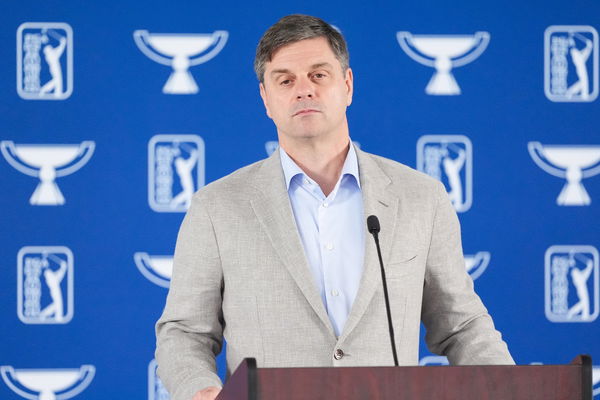
via Imago
August 20, 2025, Atlanta, Georgia, USA: Brian Rolapp, Chief Executive Officer of the PGA, Golf Herren Tour, speaks to the media ahead of the 2025 TOUR Championship at East Lake Golf Club. Atlanta USA – ZUMAw109 20250820_fap_w109_006 Copyright: xDebbyxWongx

via Imago
August 20, 2025, Atlanta, Georgia, USA: Brian Rolapp, Chief Executive Officer of the PGA, Golf Herren Tour, speaks to the media ahead of the 2025 TOUR Championship at East Lake Golf Club. Atlanta USA – ZUMAw109 20250820_fap_w109_006 Copyright: xDebbyxWongx
The PGA Tour’s decision to cut Korn Ferry Tour graduates from 30 to 20 has drawn sharp criticism from players and analysts alike. Tommy Gainey called it “insane,” while Brandel Chamblee warned it could “destroy the pipeline that builds stars.” The move sparked concern that aspiring pros would face even steeper odds breaking into the PGA Tour. But Ben Griffin, a former Korn Ferry competitor, offered a different perspective
Speaking at the DP World India Championship press conference, the 28-year-old argued that while fewer players earn cards, the 20 who do will benefit from improved access to tournaments.
“Even though the number of graduates is smaller, those 20 players will get more playing opportunities early in the season,” Griffin said. “Guys finishing 101 to 125 are now behind them on the priority list, so they’ll have a better chance to play in more events and against the top competition.”
ADVERTISEMENT
Article continues below this ad
What do think golf fans? https://t.co/5pw5MBMRPc
— Josh Teater (@jteater12) October 29, 2024
Griffin acknowledged the tradeoff directly. “It’s true fewer new players are on the PGA Tour, but the ones who make it now are better positioned to compete. That was the goal this season, to make sure they play more, not less.”
He went on to give a pragmatic take on the change. “So I can’t really speak on whether I think 20 or 30 is right or wrong. I think the ultimate goal this season was to make sure those guys off the Korn Ferry Tour are going to play in a lot more events.”
The policy change was approved by the PGA Tour Policy Board on November 18, 2024, under CEO Brian Rolapp. The reforms, set to take effect in 2026, reflect a broader shift toward smaller, more exclusive fields and mark a significant change in how the Tour manages its top developmental talent.
PGA Tour Policy Changes Split Elite Stars and Struggling Pros
Griffin’s defense comes amid widespread backlash to policy changes approved by the PGA Tour Policy Board on November 18, 2024, set to take effect in 2026. The reforms extend beyond Korn Ferry graduates: field sizes will shrink from 156 to 144 players, Monday qualifiers may be reduced or eliminated, and exempt status drops from the top 125 to just the top 100 in the FedEx Cup standings.
What’s your perspective on:
Is the PGA Tour's decision a necessary evolution or a setback for aspiring golf stars?
Have an interesting take?
Criticism has been swift. Tommy Gainey, currently 217th in the FedEx Cup Fall Standings, called the move “insane,” arguing it disregards the depth of talent in modern golf. Gainey, who finished 52nd on the 2025 Korn Ferry Tour Points List, faces a direct impact under the new system. Critics have even called the Tour’s direction misguided.
For instance, Lucas Glover suggested the changes set the sport back, while Brandel Chamblee warned they could disrupt the developmental pipeline that produces future stars. Yet not everyone opposes the reforms.
ADVERTISEMENT
Article continues below this ad
Rory McIlroy said in March 2024 that he supports “less players and fewer Tour cards, rewarding only the best of the best.” Wyndham Clark advocated an even smaller Tour of just 100 players with annual relegation for 20. The divide underscores a generational and ideological split.
Established stars like McIlroy and Clark, whose positions are secure, embrace a “cutthroat” model. Players like Gainey, fighting for limited access, face career consequences. Griffin offers a middle-ground perspective.
Finishing eighth on the 2022 Korn Ferry Tour before earning more than $10.6 million on the PGA Tour, he understands both the struggle and the benefits of prioritizing top performers.
ADVERTISEMENT
Article continues below this ad
His outlook is shaped by his own unconventional journey, including leaving golf in 2021 to work as a mortgage loan officer before returning via Q-School. Griffin’s experience informs his nuanced view on who deserves full Tour access and how the system should reward developmental success.
New CEO Brian Rolapp, fresh from a 22-year tenure orchestrating $110 billion in NFL media deals, is pushing the Tour toward smaller, more exclusive fields in 2026 and beyond, prioritizing quality over quantity in elite competition.
ADVERTISEMENT
ADVERTISEMENT
ADVERTISEMENT
ADVERTISEMENT



Is the PGA Tour's decision a necessary evolution or a setback for aspiring golf stars?